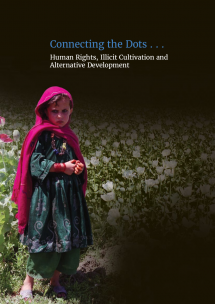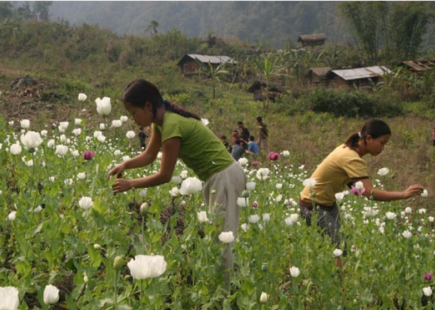Connecting the dots... Human rights, illicit cultivation and alternative development
Regions
How can we resolve the tensions between current drug control policies and states’ human rights obligations? The international human rights framework clearly establishes that, in the event of conflicts between obligations under the UN Charter and other international agreements, human rights obligations take precedence. As legally regulated cannabis markets start to grow, now is the time to secure a legitimate place for small farmers using alternative development, human rights and fair trade principles.

Downloads
Authors

Romesh Bhattacharji
There are clear tensions between current drug control approaches and states’ human rights obligations. Over the last years, the need to respect human rights in drug control policies has become more widely accepted, with the UN and EU making explicit reference to it and creating some room for alternative approaches. However, until today, supply reduction policies are still frequently implemented in ways that violate the human rights of subsistence growers of coca, cannabis and opium poppy. This is due to forced eradication and ill-designed crop substitution programmes, which result in repercussions such as the loss of livelihoods, stigmatisation and marginalisation of small-scale producers, extortion, imprisonment, displacement, environmental degradation, and the criminalisation of indigenous and traditional cultural practices.
In envisioning the way forward for aligning drug policies around illicit cultivation with human rights obligations, policy makers could draw upon lessons learned in successful drug policy reforms addressing consumption, especially as pertains to decriminalisation, harm reduction, proportionality of sentences, alternatives to incarceration and involvement of affected populations in policy making. Ultimately, in some cases, it will also be necessary to challenge certain inconsistencies and outdated paradigms of the drug control treaty regime that constitute irreconcilable obstacles for truly harmonizing drug control and human rights obligations. Especially with regards to indigenous rights, there is an undeniable conflict between international human rights obligations and the UN drug control treaties.
Key Points
- Around the world, millions of farmers and other people living in rural areas depend on the cultivation of coca, opium poppy and cannabis to reduce food insecurity and to secure an adequate standard of living for themselves and their families.
- Gradual reduction, proper sequencing, tolerance for local culture and community participation were relatively common features in alternative development programmes until the mid-1980s. Today, in spite of the improved discourse around alternative development, the application of such principles in practice has become the exception rather than the rule.
- The UN drug control conventions have an inherent bias towards criminalisation and repressive law enforcement, establishing floors with no ceilings. However, the international human rights framework clearly establishes that, in the event of conflicts between obligations under the UN Charter and other international agreements, human rights obligations take precedence.
- Forced eradication in the absence of alternative livelihoods violates people’s rights to live a life in dignity and to be free from hunger, as well as their right to an adequate standard of living. This represents, therefore, a policy option that is in conflict with international human rights law.
- Increases in illicit cultivation, as recently reported for Colombia and Afghanistan, tend to trigger a political response of more repression and eradication that risks making things worse, especially in circumstances where drugs and conflict dynamics are interconnected. Peace building and sustainable development both require time, sufficient resources and community ownership.
- The drug control treaties leave sufficient flexibility to allow states to refrain from forced crop eradication or incarceration of subsistence farmers, as they refer explicitly to providing measures for social reintegration and rural development “as alternatives to conviction or punishment”.
- The dominance of repressive realities on the ground and the lack of commitment to alternative development by donors have turned the global discourse around alternative development largely into a “virtual reality”, perpetuating the myth that a human rights-based and development-driven approach to illicit cultivation exists in practice.
- In spite of multiple references in international drugs policy documents to the importance of community involvement and a gender perspective, the space for serious dialogue, in which community representatives including women have substantial leeway for negotiation about the design and implementation of alternative development projects, is still very limited and often non-existent.
- Coca, opium poppy and cannabis have been grown for centuries for traditional medicinal, cultural and ceremonial purposes. The 1961 Single Convention on Narcotic Drugs’ enshrinement of a zero-tolerance approach towards those practices and establishment of an obligation for states to abolish them represents a historical mistake rooted in colonial attitudes and cultural insensitivity.
- Countries truly committed to human rights protection in drugs policy must recognise that, when it comes to indigenous, cultural and religious rights, full compliance will require the amendment of, or derogation from, certain provisions in the drug control treaties.
- The expansion of licit uses of poppy, coca and cannabis offers opportunities for farmers to transition away from dependence on the illicit drugs market. Alternative development, human rights and fair trade principles need to be employed to secure a legitimate place for small farmers in the fast-growing legally regulated cannabis markets.
- The UN Guiding Principles on Alternative Development and the development chapter of the 2016 UNGASS outcome document should be implemented in coherence with the UN Tenure Guidelines, the Rights of Indigenous Peoples, the Rights of Peasants and the Sustainable Development Goals to ensure that “no one is left behind.”
